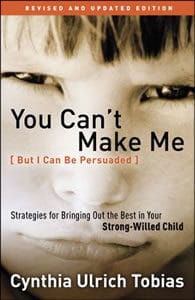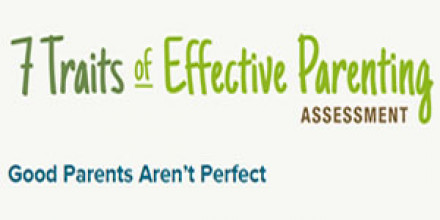
The War of Words
In this Adventures in Odyssey drama, a carelessly uttered word from Eugene creates havoc as it becomes the fashionable insult, resulting in a lesson about the power of words.
Home » Episodes » Focus on the Family Broadcast » Practical Advice for Parenting Strong-Willed Children (Part 1 of 2)
Cynthia Tobias: I don’t have trouble with authority. I know authority has to be in place, but you’re not the boss of me. You can’t force me to do something. You can’t force me to love you, can’t force me to respect you. In the end, you can’t force me to do anything. I figured that out at 18 months. You know, they can open your mouth and they can put the peas in, and they can force your mouth closed, but they cannot force you to digest peas.
John Fuller: Well, that’s a humorous insight, and that’s from a self-proclaimed strong-willed child, now adult, Cynthia Tobias, and she’s with us to share her personal insights to help you with your headstrong kids. This is Focus on the Family. I’m John Fuller, and your host is Focus president and author Jim Daly.
Jim Daly: Yeah, I’m sure many of you, uh, can relate to what Cynthia shared there. It seems like every family has at least one strong-willed child, and I know we do. We’ve only got two, so I’m not gonna say who it is, but, uh, uh, today we want to return to this popular program because Cynthia has such helpful insights on raising and disciplining strong-willed children. Uh, she’s an expert, and last time this aired, a mom named Amy from Kansas sent us a note, and, uh, I want to read that whole comment, because it perfectly describes what we’re about to hear. She wrote: “Our first child is so strong-willed, and we’re going crazy. I heard your program with Cynthia Tobias, and I was sure that you had hidden cameras in our home.” Boy, that sounds like many of us, huh? “You described our child and parenting challenges. This morning, we had a situation and I asked, do you want us to be disappointed in your work? And wow, it worked. He answered calmly and politely, no. And that was it. No argument back, no blaming someone else. Wow. Thank you, thank you, thank you so much for airing this. I can’t tell you how many tears I’ve shed, how much of my voice I’ve lost, and how much sleep I’ve missed just trying to make any progress to no avail. It’s encouraging to know that we are not the only parents with a child like this.”
John: Uh, she’s not.
Jim: Yeah.
John: And this is wonderful affirmation for what Cynthia shared and the kind of practical advice we have for folks today.
Jim: Well, and John, that’s what we’re trying to do with the broadcast each and every day, uh, to provide you some hope, no matter what it is, and this one’s about strong-willed children. So, if you’re the grandparent or the parent of that child, um, listen in. You’re going to enjoy this, and share with others, uh, through the download app and other ways that we can do that.
John: Yeah, let’s go ahead and listen now to the conversation with Cynthia Tobias on today’s Focus on the Family.
Jim: Cynthia, it is great to have you back here at Focus on the Family.
Cynthia: Oh, it’s always great to be here. Thank you so much.
Jim: Now, Cynthia, you used to be, this is what I love about you. You used to be both a teacher and then you were in law enforcement.
Cynthia: That’s right.
Jim: I mean, what a combo, uh, career that must have been.
Cynthia: And it has more in common than you think, doesn’t it?
Jim: It really does equip you. Yeah, I mean, teacher, cop. I mean, kids must love that.
Cynthia: They did, you, ’cause you can always get ’em back with a good cop story. You can always get the attention back.
Jim: Yeah, I bet.
Cynthia: I get a lot of respect in the classroom.
Jim: And you’ve done so much. You’ve written so many books, and you really do have a heart for these strong-willed kids, because you were one, weren’t you?
Cynthia: Yes, I, I’m, I am one, ’cause, um, you can ask my husband.
John: You don’t outgrow it?
Cynthia: I don’t outgrow it. Um, I have one, because my mother prayed that would be so, and, um, and then I’ve talked to so many thousands of them over the past couple decades and it’s just, it’s so rewarding to be able to have that, not only have that in common, but to have them share with me, “Yeah, this is me. Boy, I could have written this book. This is truly how I think.”
Jim: Hmm. Oh.
Cynthia: And, um, that’s good.
Jim: Let’s mention that book, because it is a great book for parents who are dealing with this, and even parents who don’t know if they are or they are or they are not dealing with a strong-willed child.
Cynthia: Right.
Jim: The title is You Can’t Make Me (But I Can Be Persuaded).
Cynthia: That’s right.
Jim: I love that title. Uh, tell us the attributes of a strong-willed child. Where is a parent, how do we start discerning a strong-willed child’s behavior?
Cynthia: Well, you can really probably from the womb, the mothers. Ha, I certainly could from the beginning. Um, but, uh, about 18 months or so. Uh, uh, by 18 months, you can really see some patterns emerging, and, and I, it’s not negative. A strong will in and of itself is very positive, and you want all your kids to have a certain amount of strong will. But how you guide it, how you direct it, you see strong convictions, um, you see determination, you see, um, where they’re not easily daunted, not easily discouraged, doesn’t necessarily take no for an answer. You can tell me it’s impossible to do, but all I think is, “You mean it’s never been done yet.”
John: Mm-hmm.
Jim: Now, when do those attributes start appearing? At one, two, three?
Cynthia: I think even in infancy, uh, personally, having been a mom of twins especially.
Jim: So you can see it.
Cynthia: I could see. I mean, I felt it, ’cause I had twins. I had one boy in one place and one in the other, and even before they were born, I saw it.
Jim: Mm-hmm.
Cynthia: Isn’t that, it, and that was strange, but especially in toddlerhood, and it really shows up in the, they, what we call them the terrible twos, but they’re really kind of the turbulent twos. Um, but all through their life, and I, it depends, again, how much it shows up depends on the kind of parenting style and whether or not the strong-willed child has an opportunity to exhibit those traits in a positive way. But all through your life, and you never, ever outgrow it. But some of the most successful people in the world have a really good, strong dose of strong will. It’s just, when you’re a parent and your strong-willed child is young, they have to practice on you. ‘Cause, I mean, when you think about, who else do you want ’em to practice on, right?
Jim: That’s right.
Cynthia: You have the budding young attorneys and politicians and preachers and salespeople, and if we can just guide it and direct it in the right way, God has given us a great compliment to be a parent of a strong-willed child.
Jim: I can, I remember, uh, one of the incidences with my strong-willed child. Uh, Jean was having a tea for the ladies and she had put out all these chocolates on the table, and several were missing by the time the tea came around, and she said to Trent, I, uh, just outed him.
John: The, the unnamed strong-willed child.
Jim: The unnamed strong-willed child. But she said to Trent, uh, “Did you eat all these chocolates?” And he said, “No.” And she said, “Well, where, why are all these chocolates missing?” And he said, “I didn’t eat all of them, I ate some of them.”
Cynthia: That’s right.
Jim: That’s what a strong-willed child will say, right?
Cynthia: That’s right, exactly.
Jim: It’s the letter of the law.
Cynthia: Right, ’cause we can always find just a little way to, to go around something. My son did the same thing when they were toddlers in the backseat. I heard, I heard Mike, the strong-willed one, slap his brother Robert on the leg, and I said, “Michael, don’t hit your brother.” He goes, “I didn’t hit my brother.” And I said, “I just heard you hit him as hard as you could.” And he goes, “I didn’t hit him as hard as I could. I could have hit him a lot harder than that.” It’s the same kind of thing.
Jim: So he had to be very, very accurate.
Cynthia: That’s right, how you word it.
Jim: Uh, we, we’ve talked about the positive attributes. I mean, these kids can have determination, they have grit, they really want to get it done. Uh, they can be extremely loyal. Uh, yet, at the same time, there are some downsides. Let’s touch on those. Uh, we’ve touched on a bit of that, but let’s talk a bit about that downside, the negative aspects of strong-willed children.
Cynthia: You know, when it goes sideways, um, and it goes sideways most quickly when there’s a bony finger pointed in my face.
Jim: Uh-huh.
Cynthia: Or when someone, uh, you know, is, it sounds like an edict or an order, then I tend to, as a strong-willed child, react with rebellion, with a little bit of defiance, with no, you can’t make me, and I don’t want to do it, and I don’t have to if I don’t want to. Um, so then I can become a, a real drain on the family, for one thing, ’cause it takes all your energy just to try to get me to obey. And, uh, what happens with parents a lot of times, when I don’t obey the first time, then they just keep drilling in and drilling and drilling and drilling, and pretty soon, they’re the ones with high blood pressure, headaches, all kinds of problems, and I’m the strong-willed kid going, whatever. You know?
John: So, you’re winning.
Cynthia: I’m winning. Uh, absolutely, because we talk about those who anger you, control you. And I learned that at a very early age.
Jim: Well, talk about that, because, uh, it, for the parent who understandably gets angry when this child is not doing what you’ve asked them to do, even politely, you know?
Cynthia: Right.
Jim: As Christian parents who want to do this well, so we’ll say, “Hey, little Johnny, can you put your shoes and socks away?” And you get nothing, or you get no. Come on, let’s get that done now. And then before too long, would you put those socks away now?
Cynthia: Yeah.
Jim: And that child really digs in at that point.
Cynthia: Yes, but the key to all of it, and, and I’ve talked to thousands, and everybody tells me we all agree, they key to it is how you ask us, how you talk to us. We wouldn’t respect you if you seemed to be asking permission, um, because you’re the parent. We know you’re the parent, and I’m comfortable with that authority, believe it or not. And every strong-willed child, I’ve even talked to kids that are in jail, and they’re fine with authority. It’s just how it’s communicated. So, if you come across as kind of weak and tenuous and scared of me, I’m not gonna obey you. Or if you come across with the, the typical positional authority, which is listen, you better do what I tell you to do because I’m your dad, or I’m your mom.
Jim: Mm-hmm.
Cynthia: And you better do it now. Then, that has the opposite effect, too. It’s an authority that says, look, I need you to put your soc-, uh, shoes and socks on now, okay? And, and I say no. What’s the problem? Well, I just don’t know which socks I’m gonna wear. Well, okay. Let’s choose them and then let’s get them on, okay? Okay. Usually, 80% of the time, that conflict is just because I wanted to have just a little bit of control over myself. I, I don’t need to control you. I just can’t let you take all control away from me, which is what you do if you say, “This is how it’s gonna be.” Period, end of discussion.
Jim: Here’s another example that I love. There’s a, actually, a commercial on television I caught the other day. It’s a little boy that sits down at the table, and I don’t even know what the product’s for, but this little boy, the, the byline is, “Eat your vegetables or you won’t leave the table.”
Cynthia: Yeah.
Jim: And the next scene, you see him as an old man.
Cynthia: The old man.
Jim: With a long gray beard.
Cynthia: Right.
Jim: Like, that’s a strong-willed child.
Cynthia: That’s right. I’ll stay here as long as I need to stay.
Jim: But that, that’s one that parents really struggle with. You’ve got to eat that before you leave the table. Is that a good declaration of war?
Cynthia: You know, almost anything that in-, entails the threat, the ultimatum. Look, if you don’t clean that room, there’s not gonna be any ice cream for you. It, you better get your homework done or you’re not do-. Anytime it’s phrased that way, um, you ha-, you just have to remember that as a strong-willed kid, we all know that there is pain for gain, right? We know there’s a price to pay. I expect to pay the price. It would be nice if I didn’t have to, but I expect to pay that ticket and pay that price. In my mind, as a strong-willed child, it all depends on how much I’m willing to pay. How long will I be grounded? Six weeks or less? Could be worth it. Right? Um, how hard will I be spanked if I get up on that table where I’m not supposed to go? ‘Cause it can’t last that long. It can’t be that hard. You’re probably not gonna kill me, right? So, if I’m thinking like that as the strong-willed child, this positional authority parent is thinking they’re gonna find something that, if it’s bad enough, will force me to do it, and I’m here to tell you it isn’t that way. It, there is no hammer that’s gonna force me to do it, because I can die, figuratively at least, before I’ll do it.
John: Yeah. Cynthia, you said something a moment ago that I am not able to just kind of skim past. I, I’m stuck here, and I’ve heard you on Focus on the Family. W-, I’ve read your books. We’ve talked before. Uh, this is all rooted in control for that child. You said it, as a strong-willed child, you didn’t want to give up all control over your own destiny, if you will.
Cynthia: That’s right.
John: I never realized that.
Cynthia: And, and in the book, this new revised edition is great ’cause we’ve got four new chapters and strong-willed child emergency kit and stuff, and one of the things that we give in here, the three critical truths about how the strong-willed mind works. And I’ve done this for years now, years and years, and I’ve never had anybody disagree with me. But the first critical truth is it’s not authority, it’s how it’s communicated. And the second critical truth is I don’t need to control you, I just can’t let you take all control away from me. I need you to share it with me. In other words, saying, “Look, where do you want to take your nap today?” In other words, there will be a nap. I will let you, you know. And I say, well, I want to take it out on the front yard, and you say, nice try, can’t do that. Where, what are your other choices? But where you can kind of give me a little bit of sway. I don’t need a lot. I just need for you to respect me the way you want me to respect you. And if you don’t model the respect that you want from me, it’s very difficult, if not impossible, for me to give the respect to you.
Jim: In fact, Cynthia, there’s something you raise in the book. “The okay question.” I love that, which, try to end your comments with, “Okay?”
Cynthia: Right.
Jim: Which conveys control back to that strong-willed child.
Cynthia: Yeah.
Jim: Will you go to bed now? Okay?
Cynthia: Yeah.
Jim: That kind of thing.
Cynthia: And, but, and here’s the key to that, and, and every strong-willed child that listens to me will know this is true. It’s all in how you say the okay, ’cause it is a magic word but you have to say it in a certain way. In other words, you wouldn’t say to your child, “Oh, I just need you to do this for me sweetheart, okay?” ‘Cause then, to me, I’m thinking weakness, tentative, I have to destroy you, I have to fight my urge to destroy you. But if you say it calm and firm, and you say it with the tone that says, look, I know you could die if you want to, I’m hoping you don’t choose to, need you to put your seatbelt on, okay? No, uh. My response is no. Then you say, “Wh-, why not?”
Jim: Hmm.
Cynthia: But, it’s too tight. I don’t like it. But, let’s loosen it a little and then put it on, okay?
Jim: Mm-hmm.
Cynthia: Okay. That’s when, eight out of 10 times, I come back. I just need a little bit. That’s my little tiny bit of control, see? Just a tiny, tiny bit. Instead of saying, “Get in the van, we are late.” If you say, “Hey, you ready to g-, you about ready to go?” And I say, “Oh, oh, yeah, I’m gonna go get a drink and I’ll be right there.” I mean, parents are amazed at how often they get cooperation if they’ll just stop for a minute and think about how they’re about to phrase this, and asking questions does not mean you’re asking for permission. You are not asking for your kid’s permission to obey. That’s clear. Your authority is, it, intact, and your accountability’s intact. But the way you say it, the respect that you give me, even as a very young child, let alone a teenager, that says, in essence, tells me you always have a choice.
Jim: Hmm.
John: Well, you’re listening to the wisdom of, uh, Cynthia Tobias on today’s Focus on the Family, hosted by Jim Daly. I’m John Fuller, and, uh, the foundational book for our conversation is, You Can’t Make Me (But I Can Be Persuaded). And, uh, Cynthia, a moment or two ago, you mentioned three things going on in the minds of a strong-willed child. We heard two. Why don’t you go ahead and recap the first two and give us the third as well?
Cynthia: Right. These are three critical truths to how the strong-willed mind thinks and works. The first one was it’s not authority we have trouble with, it’s how you communicate it. The second one, I don’t need to control you, I just can’t let you take all control away from me. And the third one, which is really crucial, is the quality of the relationship with that strong-willed child will directly determine the effectiveness of your techniques. In other words, if there is a positive relationship that I want to preserve as a strong-willed kid, then I will work with you, and you’ve got leverage with me. But if there’s no relationship I care about, there’s no real upside, you’re always looking for the worst anyway and I know that you think I’m gonna cause trouble, so the next thing’s gonna be trouble, too, then really, you have no leverage, ’cause there’s no upside for me to keep a relationship together.
Jim: Mm-hmm. Uh, Cynthia, I think that’s a critical point, and, uh, the relationship, when you look at, uh, parents that are struggling in the teen years with their kids, typically, this is the core problem. Uh, there’s so little relationship that the teen is just going his or her own direction, and the parent, who wants more control, is actually hopeless, ’cause they have absolutely no control.
Cynthia: Right.
Jim: And that’s a very dangerous moment in the relationship, uh, with your child. How does a parent build that relationship if they’re saying right now, oh, no, I’ve blown it? What can they do to start repairing that?
Cynthia: Well, you know, sometimes it’s as simple as just being honest with me. It’s, you know, being able to say, “Wait, I think I need a do-over. What I really meant to say was, and maybe this didn’t come out right, but here’s what I’m really going for.” If you’ll just be honest with me, I, I call it my glass door theory, right? If your life is a glass door, I can see right through you. So, you know, your stubborn insistence that I can’t know what’s going on is only gonna make me not trust you more. So, just be honest with me. Say, “Man, sometimes I think you came from a different planet. I, I need help here. How, what’s gonna work with you? What do you need me to do?” And it catches me off guard, as a, especially as a strong-willed kid. Teenager, I’m thinking, wow. I mean, my parents aren’t thinking that they’re perfect and that, thinking. They’re actually asking me what works. Now, they’re not asking my permission, and they’re not saying you can do whatever you want, but they’re saying, “You know what’s really important to me is this, and, and here’s what I’m trying to establish. I’m not sure I’m going about it the right way, but I know I’m looking for the right end. Can you help me figure out how to get there?” And, and then the kid’s going, “Huh.” I mean, then I’ll just, sometimes I’ll just do it your way, just because you were honest with me, and just because you treated me well. It’s, it builds a relationship where I care about you, ’cause I sense that you care about me. You care what I think about you. You care about the relationship. I mean, let’s face it. As strong-willed kids, you know, we, we walk into a room, people aren’t always that happy to see us come in, ’cause, ’cause our reputation precedes us, right? And sometimes as parents, we just have to practice smiling more at that kid, even when I don’t feel like it.
Jim: Yeah.
Cynthia: I’m not that happy to see you, but if I can just put a smile on my face and say something good to you, as a strong-willed kid, wow. Wow, it’s great to see you here today. I’m, you know, I don’t know if I’ve told you lately, but I feel really privileged that God trusted me with a kid like you. You’ve got the most incredible strengths. Sometimes they drive me crazy, but I appreciate you.
Jim: They really do need encouragement.
Cynthia: They do.
Jim: And you can find the, the, the simplest ways to do that. Uh, the other day, this is hilarious. We had a balloon get caught in our ceiling fan probably three years ago, and we haven’t used the ceiling fan for three years because it’s 20 feet high. It’s the highest point and it’s two stories up in our living room. And so, I mean, just the other day, I thought, I saw a ladder here at Focus. I thought, “I’m gonna take that home.” Because it looked big enough. But lo and behold, it was short.
John: Oh, man.
Jim: It was still a 10-foot ladder, but even at 6’2″, it wasn’t enough. And I said to, to Trent, who is really good at problem-solving, I said, “What would you do?” He lit up when I sa-, said, you know, you’re really good at solving problems. What would you do? ‘Cause I’m out of answers.
Cynthia: That’s right.
Jim: And he, he got right to it. Well, we could put blocks under the ladder, we could do all this stuff. But you can find ways to encourage your strong-willed children.
Cynthia: And, and by the way, that’s one of the favorite things that came up over and over with strong-willed kids I talked to. We would much rather have compelling problems to solve than just a list of chores to do, so you did exactly the right thing, intuitively as a parent, saying, you know, wow, this is my issue. This is what I have to solve here, instead of saying this is what you need to do and it needs to be done now. Make it a compelling problem that I can help you solve and the chances are good you’ll have my cooperation.
Jim: Cynthia, for a parent to switch that gear, because here you are, a mom and you’re doing the diapers, and then they’re eating solid food, and now you’re getting him ready for kindergarten. You, you really got to flip a switch to parent them slightly differently, don’t you? ‘Cause doing the chores is what I need you to do. Take out the trash, help with the dishes. But to give them a problem to solve, it, you got to be thinking like a teacher almost.
Cynthia: Right. And, you know, one of the things mentioned at the back of the book is you don’t have to do all this at once. You don’t have to change everything at once. You know, maybe start with, with one area that’s really a problem, and just work on it for a little bit, and, and practice a little. And, and you know, use your strong-willed friends or may even spouse as resources. There’s, it’s great to go up to a strong-willed adult that you know and say, you know, I got a kid a lot like you. I need a little advice here.
Jim: Mm-hmm.
Cynthia: And what’s great, and what I loved about doing wi-, the book is just talking to other strong-willed minds that just either verified or expanded and said, you know what really worked for me was, and that’d be great.
John: Mm-hmm. Uh, I hear you saying something, Cynthia, that I don’t believe I got when I was a new parent, and, and Jim, I don’t know if you caught it or not. I thought it was my job to mold my child, and, um, you’re saying it’s, it’s a lot of work, and Jim, you’ve made this point already. It’s a lot of work to shift your parenting style to adapt to the kid. And for a long time, I was going off that positional authority you’re talking about, and I’m in my child’s face saying, “Hey, you got to get this done.” And she’s thinking, why? And for so long, I was refusing to change my parenting approach. There’s great wisdom in what you’re saying. I want to make sure that, that I’m understanding that properly, though. You’re not saying acquiesce.
Cynthia: Right.
John: You’re just saying see what your child’s bent and gifting is and adapt?
Cynthia: Right, and if you look at Proverbs 22:6 that talks about train up a child in the way he should go, right? Then we’re thinking that means we tell them what to do. But if you really think about it, the greatest thing we can do for our kids is to train them to be adults, and by doing that, we want to shift some responsibility for learning to them, shift some responsibility for behavior, and the younger they are, the lower the price tags are, right? ‘Cause by the time they get to be 16 or 17 or when they graduate, if we haven’t let them make decisions and let them make mistakes and figure out tuition for lessons, then we are not doing them a service. We haven’t trained them. We haven’t trained them to figure out what their strengths are or how to use them. We’ve just trained them to listen to what we tell them to do and do it, and they’re about to walk out of our home, and now what?
John: Hmm.
Cynthia: So, I really think that the training comes in for us as parents. We’re so much wiser if we help them figure out as we go. This is why this has to happen. Why do I have to do stupid, dumb, boring homework? Well.
Jim: Yeah, that comes up quite often.
Cynthia: It, it comes up, yeah.
John: I’ve never heard it in my home. I don’t know.
Cynthia: And you, and then you say, well, why, you know, what do you, what do you think the reason would be? ‘Cause the teacher just wants to torture me. It’s possible, but, you know, do you think it’s possible to get a good grade without doing the homework? And you know, have them think about what it is and say there are times when it is just hoops that you have to jump through. So, let’s think about what would help you do the homework when you’re really bored. ‘Cause they need to think, as kids, uh, what do I need if I’m bored? What happens? What do I need to do if I don’t feel like doing things I don’t want to do? I can’t just tell you as a parent. I can, but it doesn’t help you. You need to be thinking about this, so that later when you are growing up, you can think, wow, how am I gonna get myself motivated to, to do it when my mom’s not here to say do it?
Jim: Uh, Cynthia, one of the difficulties is we live in this natural world. I mean, for both moms and dads, there’s a breaking point for you, and there’s a lot of tension in a strong-willed child home, because that child is constantly testing those boundaries, constantly coming after you to be in control, or at least gain some control, and you’re fighting that, and if your personality bent is toward higher control, you’ve got this tremendous conflict going on. Uh, at some point, you’re gonna have a meltdown. What should a, a parent do, a mom or dad? What advice do you have for them when that moment hits, and that natural human emotion is coming up and you begin to act like the child and not the parent, what do you do?
Cynthia: Well, you, you know, first of all, you, if you have a relationship, you’re in good shape, ’cause if there’s a relationship that we have together as parent and child, then I’m actually, as a strong-willed kid, I’ll give you grace. There’ll be times when you’ll just snap at me, or point your bony finger at me, and it’ll be okay, because I know you don’t always do that, and I know you’re under a lot of stress. So, I actually give you grace, and you can even, if you can keep a sense of humor, if you can say, “Are you trying to get in trouble?” And I go, “No, is that, is that what I’m doing?” Oh, yeah.
Jim: Yeah, maybe.
Cynthia: That’s where you’re headed. You know? And, so now you’re smiling and I’ve got this opportunity you just gave me for this fire escape, to back off. So, sometimes just, you know, lightening up a little. But we talk about, in chapter seven, we talk about the strong-willed child emergency kit, and basically, what that emergency kit is that, you know, the three steps. Number one, if you’re in the middle of a meltdown, you need to back off, because the further you press in with me, it’s not gonna get any better, because you’re already pointing your finger at me, and if you think by pressing in and saying it louder and slower is gonna make it better, you’re mistaken, ’cause I’ve already shut down. I’ve al-, the wall’s already gone up, so you can yell all you want. We’re done. And, and you as a parent, you’re going crazy because you’ve got more to say, but I don’t want to listen. I’m not listening ’cause you’re yelling.
Jim: Hmm. So, back off.
Cynthia: Back off. Get your perspective. Just walk away and say, you know what? I, I just needed a, a few minutes here to cool off before I say something I regret, and, or, you know, like one mom, she said, I, sometimes I’ll say, “I’m gonna pretend you didn’t just say that.” And walk away. Because then, get the perspective, right? And, and then, number two, decide what, what’s the point? What am I trying to achieve here? Okay, think for a second. What am I trying to do? ‘Cause as a parent, I’m just getting carried away ’cause I wanted it done my way, and I’m in a hurry, and for heaven’s sake, I don’t have time to think about how this kid thinks. So, just think about, look, and, and back off and say, maybe, a do-over. Look, I just need this to be done. Do you have another idea on how to do it? Um, and then the third thing is the honesty thing. Just, and again, saying, “This isn’t working. I’m irritated more than I can tell you, and I love you, and I don’t want to yell at you. This isn’t working.”
Jim: And that can be so hard. Cynthia, we have run out of time, and we, I, let’s come right back next time, if you can stick with us.
Cynthia: Absolutely.
Jim: And let’s pick up on the honesty part, because I think that’s very difficult for parents, to humble themselves and be honest with their kids. Can you do that?
Cynthia: Absolutely.
Jim: All right, let’s do it. Your book, You Can’t Make Me (But I Can Be Persuaded), Cynthia Tobias, the strong-willed child. Thank you for being with us.
Cynthia: My pleasure.
John: Well, we do hope you’re gonna be joining us next time for help with parenting your strong-willed child, and in the meantime, we have Cynthia’s book for you. Uh, just get in touch and ask for, You Can’t Make Me (But I Can Be Persuaded). It is a terrific read, offers some great insights into your strong-willed child, and Cynthia has some really positive ways to motivate your child and how to share control without compromising your authority.
Jim: And when you get the book through us, uh, those dollars go to support the ministry of Focus on the Family, and with a gift of any amount to stand with us and support families, we’ll send you a copy of Cynthia’s book as our way of saying thank you.
John: Yeah. We’d be grateful if you can support us monthly, and we always appreciate those who help to keep Focus on the Family going in that monthly way, to help parents with these broadcasts, uh, counseling, and so much more. So please, make that monthly pledge, and then we’ll send you, uh, Cynthia’s book, and you can do so when you call 800, the letter A, and the word FAMILY, or at focusonthefamily.com/broadcast. Thanks for joining us today for Focus on the Family with Jim Daly. Plan to join us next time as we have Cynthia Tobias back and once again, help you and your family thrive in Christ.

For more than 30 years, Cynthia Ulrich Tobias has been teaching people of all ages how to discover and use the strengths of their natural learning style to succeed in virtually any situation. She is an author, speaker, and the founder and CEO of AppLe St. (Applied Learning Styles). Cynthia’s latest books include The Way We Work and A Woman of Strength and Purpose, in addition to her classics You Can’t Make Me!, The Way They Learn, Every Child Can Succeed and Bringing Out the Best in Your Child. She has two grown sons. Learn more about Cynthia by visiting her website, www.cynthiatobias.com.

Receive the book You Can't Make Me and the audio download of the broadcast "Practical Advice for Parenting Strong-Willed Children" for your donation of any amount! Plus, receive member-exclusive benefits when you make a recurring gift today. Your monthly support helps families thrive.

There's no parenting formula to follow, but there are ways you can grow every day. This assessment gives parents an honest look at their unique strengths, plus some areas that could use a little help.

Visit our online store and purchase a CD of today's program for yourself or to share with a friend.

If you're a strong-willed woman, it can be tough to parent a younger version of yourself. But you also have a definite advantage – you know what it's like to be a strong-willed child.

Raising strong-willed children can be demanding, but it’s also incredibly gratifying. When taught with patience and firm, loving guidance, they can become life-changing leaders.

Do you have a teen who wants to make his or her own path? Here’s how one family dealt with an unconventional child.

Children sometimes misbehave because their parents may not have expressed their expectations clearly enough – or have fallen into a pattern of inconsistent enforcement of those expectations.

These tips from Cynthia Tobias help you bring the best of your child!

In this Adventures in Odyssey drama, a carelessly uttered word from Eugene creates havoc as it becomes the fashionable insult, resulting in a lesson about the power of words.

This discussion offers a preview of Volume #16 “Cultures in Conflict” from the That The World May Know video series, available below.

Debra Fileta will help couples better understand the four seasons of healthy relationships, what to expect during each one, and how to carefully navigate them for a stronger marriage. (Part 1 of 2)

Larnelle Harris shares stories about how God redeemed the dysfunctional past of his parents, the many African-American teachers who sacrificed their time and energy to give young men like himself a better future, and how his faithfulness to godly principles gave him greater opportunities and career success than anything else.

Amy Carroll shares how her perfectionism led to her being discontent in her marriage for over a decade, how she learned to find value in who Christ is, not in what she does, and practical ways everyone can accept the messiness of marriage and of life.

Jonathan McKee offers parents practical advice and encouragement in a discussion based on his book If I Had a Parenting Do Over: 7 Vital Changes I’d Make.